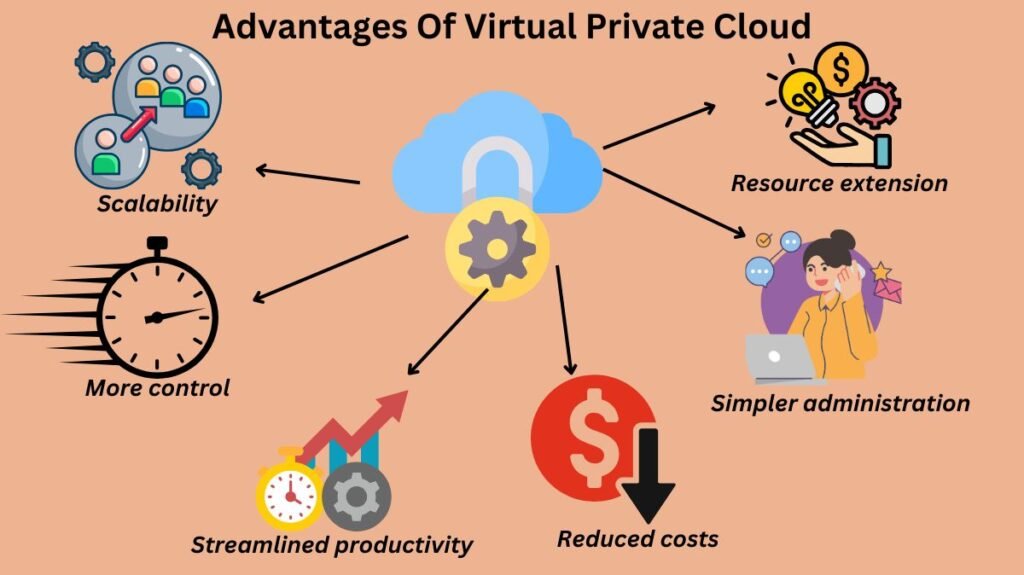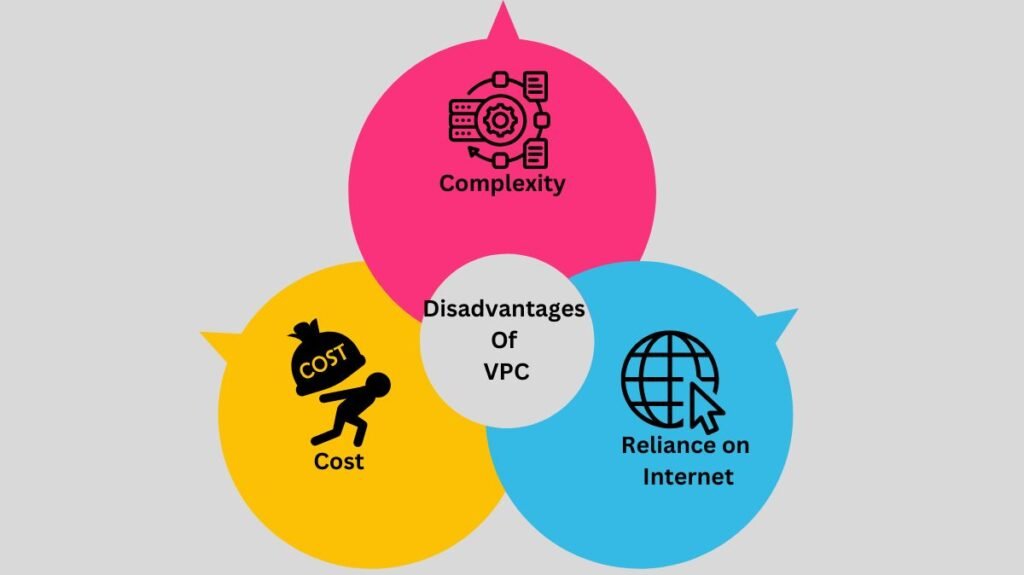Contents
- 1 Advantages Of Virtual Private Cloud
- 2 Disadvantages Of Virtual Private Cloud
- 3 Virtual Private Cloud Use cases
- 3.1 Host web apps
- 3.2 Cloud migration
- 3.3 Hybrid cloud approach
- 3.4 Multicloud deployment
- 3.5 DevOps procedures
- 3.6 High-performance computing(HPC)
- 3.7 Regulatory compliance and data governance
- 3.8 Industry-specific clouds
- 3.9 Business continuity disaster recovery (BCDR)
- 3.10 Internet of Things (IoT) and edge computing
Advantages Of Virtual Private Cloud

A virtual private cloud can be chosen for a variety of reasons, and an organisation must thoroughly assess its needs and resources to see if the advantages exceed the hazards. Among these advantages are:
Scalability
Businesses may benefit from a public cloud platform’s elastic nature without having to worry about the dangers of putting resources in a public location.
More control
You may limit instance access, screen traffic, and encrypt connections within your VPN by using a VPC.
Streamlined productivity
Businesses may prevent their own IT departments from becoming a productivity barrier by using a VPC. An organisation can implement new projects in a VPC without waiting for clearance or scope changes that IT departments can impose. In the production cycle, this can save weeks or even months of time.
Reduced costs
By building these resources digitally and storing them in the public cloud for convenient access and upkeep, businesses can also avoid making significant upfront expenditures in IT equipment. An organisation may obtain a scalable, secure, and adaptable infrastructure in this manner without having to pay for ownership.
Simpler administration
By spending less time establishing, maintaining, and verifying virtual networks, enterprise IT can devote more effort to developing services and apps that boost overall company profitability.
Resource extension
Without investing the time and money required to construct an on-premises private cloud, a business can use a VPC as an extension of its own data centre in a hybrid cloud deployment.
Disadvantages Of Virtual Private Cloud

Complexity
Requiring a high degree of technical skill, the process of transitioning from on-premises to a VPC can be complicated. Furthermore, less experienced users may find it difficult to administer several components, including subnets, routing tables, security groups, and network ACLs.
Additionally, because there are several possible points of failure that might impact the network, diagnosing problems within a VPC can also be challenging. Therefore, before choosing to adopt VPC, users should carefully assess their technological resources and experience.
Cost
Even though a VPC has numerous advantages, it can be expensive to set up and operate, particularly for startups or small organisations. In addition to the expenses of operating their resources within the VPC, further fees may be charged for data transport, IP address usage, and other purposes.
Furthermore, because of its previously noted complexity, administering a VPC may be costly, and sustaining one necessitates hiring staff with the necessary high levels of knowledge, which raises costs. Therefore, before choosing to include VPC into their infrastructure, customers should carefully weigh the expenses involved.
Reliance on Internet
Lastly, because VPC depends on the Internet, it may be vulnerable to threats like cybersecurity attacks and network failures. For example, a user’s VPC might not be accessible if their Internet connection is interrupted, resulting in downtime and lost productivity. Likewise, if a cyberattack targets a user’s VPC, their data and resources might be compromised.
Therefore, before choosing to utilise VPC, users should carefully weigh the hazards of relying on the Internet. These dangers can be reduced by putting extra security measures in place, including firewall rules or VPNs.
Virtual Private Cloud Use cases
Host web apps
You can better manage how network traffic from the Internet may access your VPC resources by securely hosting web apps.
Cloud migration
With low latency, little downtime, and strong cloud security, VPC offers an affordable means of transferring critical on-premises assets to a separate private cloud inside a public cloud setting.
Hybrid cloud approach
The modern hybrid cloud strategy is supported by a VPC. Using a VPN, developers may link VPCs to on-premises or public cloud infrastructure, combining on-premises, private, and public cloud resources to provide a single, adaptable, and cohesive IT infrastructure.
Multicloud deployment
By permitting private connections between VPCs across cloud providers, VPCs can facilitate multicloud installations. Open-source, cloud-native technologies like Kubernetes are part of multicloud solutions. Additionally, they usually have the ability to manage workloads across several clouds from a single pane of glass or central interface.
DevOps procedures
VPC environments facilitate DevOps procedures, which speeds up the provision of better services and applications. DevOps automation speeds up workflows and the software development lifecycle by using cloud-native tools and technologies to complete repetitive operations.
High-performance computing(HPC)
VPC environments enable fast-provisioning compute capacity with the best networking speeds and safest software-defined networking resources for highly regulated industries like banking and healthcare.
Regulatory compliance and data governance
Compliance with data governance and regulatory laws is crucial for multinational industries like oil and gas. The cloud VPC managed service providers of today provide hardware and software solutions for secret computing, as well as integrated security and regulatory compliance capabilities. Data residency controls and encryption choices are standard features.
Industry-specific clouds
VPCs are a perfect part of industry-specific cloud platforms, which are becoming more and more popular among sectors like healthcare and finance that want to find secure, sector-specific capabilities that can produce business results more quickly.
Business continuity disaster recovery (BCDR)
BCDR using VPCs includes safeguards to preserve data and restore service operations, much as other cloud-based services. To restore a system, application, or data centre following an interruption, they comprise a variety of tools, rules, and processes. Organizations can guarantee BCDR in the case of a disaster (such as equipment failures, cyberattacks, or natural disasters) by replicating critical infrastructure in a VPC across many regions.
Internet of Things (IoT) and edge computing
As more sectors, such as manufacturing and retail, employ IoT and edge devices link to the cloud, scalable and secure cloud environments, such as VPCs, are required.

